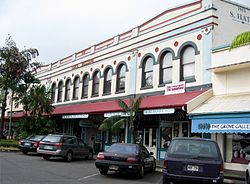S. Hata Building
| Hata Sadanosuke | |
|---|---|
| Born | 1868 Hiroshima, Japan |
| Died | Hilo, Hawaii |
| Nationality | Japanese American |
| Occupation | Businessman |
| Spouse(s) | Shindo Masae |
| Children | 1 son, 4 daughters (Tamotsu +?) |
|
S. Hata Building
|
|

Built for Hata Sadanosuke
|
|
| Location | 308 Kamehameha Avenue, Hilo, Hawaii |
|---|---|
| Coordinates | 19°43′25″N 155°5′5″W / 19.72361°N 155.08472°WCoordinates: 19°43′25″N 155°5′5″W / 19.72361°N 155.08472°W |
| Built | 1912 |
| Architect | William C. Furer |
| Architectural style | Early Commercial |
| NRHP reference # | 91001087 |
| Added to NRHP | August 27, 1991 |
| Hata Yoichi | |
|---|---|
| Born | 1884 Hiroshima, Japan |
| Died | Honolulu, Hawaii |
| Nationality | Japanese American |
| Occupation | Businessman |
| Spouse(s) | Hirata Naeko |
| Children | Yukiko, Minoru, Susumu, Akira, Yoshimi, Frank J +? |
Hata Sadanosuke (1868 - ?) was a Japanese businessman who built a historic structure called the S. Hata Building in Hilo, Hawaii, in 1912. It now contains specialty shops, professional offices, and Cafe Pesto restaurant. Sadanosuke's younger brother Hata Yoichi (1884 - ?) was another notable Japanese businessman who founded a major wholesale food distribution company in Hawai'i.
Hata Sadanosuke was born in Hiroshima, Japan in 1868 and immigrated to Honolulu, Hawaii in 1891. In 1893, Mr. Hata worked as an agent for Odo Shoten in Honolulu ("shoten" means "store" in Japanese), responsible for taking orders from large sugarcane plantations on the Hāmākua Coast which employed many Japanese immigrant workers. This gave him the inspiration to start his own business at Hilo on the Big Island on January 3, 1896 called S. Hata Shoten, Limited. He sold Japanese silks, kimonos, as well as eastern souvenirs and provisions. Business was slow in the first years, so he hired out his horse and hackney carriage as a taxicab for visitors.
After the annexation by the United States to become the Territory of Hawaii in 1898, the plantations flourished, as did his business. He moved to a larger building at the corner of Mamo and Keawe streets. He branched out back to Honolulu and Hiroshima, Osaka, Japan, Kyoto, Japan, and Yokohama, Japan.
Hata Yoichi, Sadanosuke's younger brother (born 1884) also arrived in Hilo and worked as bookkeeper at S. Hata Shoten. The business was so prosperous in 1912 that it needed more space. The previous building became a wholesale food distributing outlet run by Hata Yoichi. Sadanosuke planned a new $25,000 structure on wetlands on Front Street (later renamed Kamehameha Avenue) near the railroad tracks to the plantations. A condition of the United States government's selling this land was that Mr. Hata builda concrete building within a year's time.
...
Wikipedia

